| Srl | Item |
| 1 |
ID:
092930


|
|
|
|
|
| Publication |
2009.
|
| Summary/Abstract |
This study of global financial flows and offshore financial centres (OFCs) draws on the concept of nomadology as developed by Gilles Deleuze and Felix Guattari to argue that OFCs not only facilitate the circulation of global capital, but also serve to create the means for identity arbitrage. This concept highlights the use of the offshore in order to benefit from the variety of preferential measures offered to foreign firms and investment capital. State sovereignty authorises legislation by regimes to attract and regulate foreign investment. International banking statistics are examined for indications of the use of and impact from exploiting the offshore to establish a different national identity in pursuit of the greatest available return on investment. The paper concludes that the design of legislation by onshore states is just as complicit in the positive and negative effects of the offshore economy as are the small sovereign economies that host an OFC.
|
|
|
|
|
|
|
|
|
|
|
|
|
|
|
|
| 2 |
ID:
102449


|
|
|
|
|
| Publication |
2010.
|
| Summary/Abstract |
This paper examines a lacuna in the literature on foreign direct investment (FDI) flows to China: the absence of analysis for the prominent location of small Caribbean and Pacific islands as leading sources of FDI. An indeterminate amount of domestic capital is embedded in these FDI flows, which distorts comparative studies on FDI in developing economies between China and other states. Direct investment from China has also increased in recent years and offshore financial centres (OFCs) often serve as the initial destinations. This paper excavates the rationales behind the presence of OFCs and suggests that Chinese actors will emulate the practices of developed state multinational corporations and high-net-worth individuals. The implications of these investment practices are outlined along with possible trajectories for their impact on the process of financial liberalisation in China. Consequently, it encourages increased Chinese participation in the development of global financial governance.
|
|
|
|
|
|
|
|
|
|
|
|
|
|
|
|
| 3 |
ID:
054167


|
|
|
| 4 |
ID:
145722


|
|
|
|
|
| Summary/Abstract |
With its roots in the “war on drugs” and the criminalization of money laundering, the global initiative to combat the financing of terrorism (CFT) provides one strategy for preventing and preempting terrorist attacks. In public pronouncements, terrorist finance was named the “lifeblood” and “oxygen” for terrorism itself, thus displaying an analogy suggesting that its mere removal could bring an end to terrorism. Following the theoretical perspective of the Copenhagen School of security studies, this paper argues that national and international measures against terrorist finance constitute the “securitization” of money. By situating money as the essential component to an existential threat, it was possible to justify extraordinary measures to monitor financial transactions. These measures produced unintended consequences prompting resistance and an evolution of procedures to reduce those consequences. This paper considers two affected areas (migrant remittances and financial inclusion) and points to the potential use of financial surveillance against grand corruption.
|
|
|
|
|
|
|
|
|
|
|
|
|
|
|
|
| 5 |
ID:
079723


|
|
|
|
|
| Publication |
2007.
|
| Summary/Abstract |
This article analyses recent developments in the campaign to combat terrorist financing in Europe and questions the utility of financial surveillance as a method to counter terrorism. A background presentation of surveillance in modern society is followed by an overview of earlier international initiatives to interdict money laundering. The measures used to combat terrorist finance are built upon this foundation of surveillance and criminal investigation. Applying these measures in the 'war on terror' has unintended consequences for the financial transactions of citizens and non-citizens alike. The article concludes by considering these problems and their impact on society within the context of a larger concern for the impact to individual liberty from these surveillance practices in pursuit of security in the early twenty-first century.
|
|
|
|
|
|
|
|
|
|
|
|
|
|
|
|
| 6 |
ID:
079667


|
|
|
|
|
| Publication |
2007.
|
| Summary/Abstract |
The economies of small states are vulnerable to a variety of external factors - economic, political and environmental. One economic/financial factor confronting those small states with offshore financial centres has been the effort by the OECD to eliminate tax arbitrage (harmful tax competition). A related initiative to eliminate money laundering and combat the financing of terrorism has increased the regulatory responsibilities and costs to these small jurisdictions and represents an example for the potential consequences of the OECD project. Using economic data from several Caribbean jurisdictions, this article investigates the direct impact of these international programmes to increase financial regulation upon their financial services industries. Two specific outcomes are demonstrated: a reduction in employment opportunities and a decline in government revenues. At present this situation bodes ill for the continued operation of offshore financial centres as a method towards achieving economic development
|
|
|
|
|
|
|
|
|
|
|
|
|
|
|
|